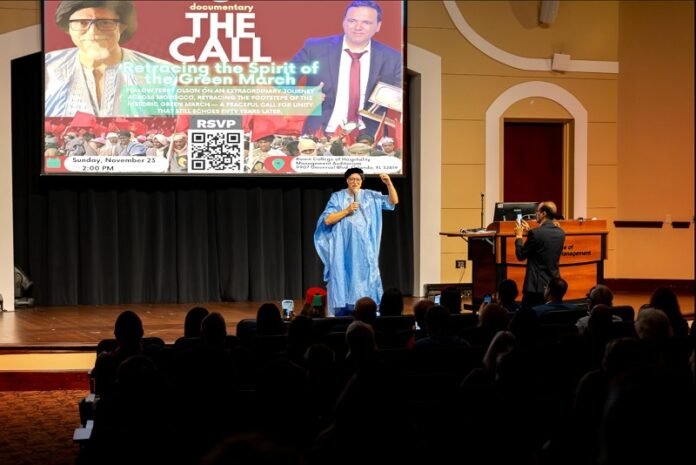Orlando – United States
The enchanting city of Orlando hosted a private screening of the Moroccan documentary “The Call”, bringing together a wide audience from the Moroccan-American community and culture enthusiasts. Organized by the Moroccan-American Cultural Association, the event became a platform for dialogue and exchange between Moroccan and American cultures, highlighting the deep cultural and emotional ties between the two peoples.
Organizers praised the documentary’s central role in promoting Moroccan identity internationally, emphasizing that the screening transcended artistic boundaries to become a diplomatic and cultural bridge. The director of this important national historical work succeeded in portraying Morocco’s rich history and cultural authenticity through a cinematic narrative.
Southern Provinces: Cultural Influence and Integrated Development
This event comes at a time when Morocco’s Southern Provinces are witnessing remarkable cultural and socio-economic development, reflecting an integrated national strategy to strengthen identity and support local populations.
Hassania Identity and Local Heritage
-
In the regions of Laayoune-Sakia El Hamra and Dakhla-Oued Ed-Dahab, festivals and cultural competitions celebrate Hassania heritage, focusing on music, poetry, and popular theatre.
-
These initiatives aim to strengthen residents’ connection to their heritage and preserve the unique cultural identity of the Southern Provinces.
Integrated Development Including Culture
-
Investments in cultural and social infrastructure, including youth centers, cultural hubs, and educational facilities, enable residents to actively participate in artistic and cultural life.
-
These projects are part of the Southern Provinces development model, integrating economy, society, and culture to ensure sustainable influence nationally and internationally.
Diplomatic and Cultural Dimension
-
Moroccan culture, particularly that related to the Sahara, has become a tool of soft diplomacy, enhancing the Kingdom’s image and connecting Moroccans to Africa and the world.
-
The screening of “The Call” reflects this approach, making the film a vehicle for international dialogue and understanding.
Youth and Arts as a Driving Force
-
Cultural initiatives actively involve youth in artistic and community activities, developing their skills and capacity to influence culture locally and internationally.
-
Culture and arts thus constitute a strategy for sustainable development rooted in identity and heritage.
Terry Olson’s Experience in Morocco
Additionally, American director Terry Olson offers a unique perspective from the Southern Provinces. In a video report, he recounts his journey to Morocco, meeting village leaders and ordinary citizens, and gaining a profound understanding of local history and identity dating back to November 1975.
Olson emphasizes that Morocco is measured not only by military power but by the strength of its communities and their faith in peace and change. According to him, the residents’ collective memory transforms into a living and enduring social force, and some stories “are not meant to stay in one city, but to travel, be felt, and inspire everyone who encounters them.”
This narrative complements the core message of “The Call,” highlighting the dynamic interaction between culture, development, and national identity, making the Southern Provinces a model of international cultural influence.
Analysis and Significance
The screening of “The Call” in Orlando is more than a cinematic event; it is a symbol of Morocco’s global cultural influence. Integrating Terry Olson’s experience emphasizes the human and interactive dimension of Moroccan culture in the Southern Provinces, affirming that culture is an essential pillar for reinforcing national identity, territorial cohesion, and international connections.


